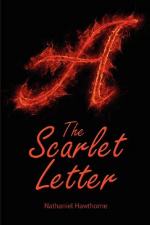But Hester Prynne, with a mind of native courage and activity, and for so long a period not merely estranged, but outlawed from society, had habituated herself to such latitude of speculation as was altogether foreign to the clergyman. She had wandered, without rule or guidance, in a moral wilderness, as vast, as intricate, and shadowy as the untamed forest, amid the gloom of which they were now holding a colloquy that was to decide their fate. Her intellect and heart had their home, as it were, in desert places, where she roamed as freely as the wild Indian in his woods. For years past she had looked from this estranged point of view at human institutions, and whatever priests or legislators had established; criticising all with hardly more reverence than the Indian would feel for the clerical band, the judicial robe, the pillory, the gallows, the fireside, or the church. The tendency of her fate and fortunes had been to set her free. The scarlet letter was her passport into regions where other women dared not tread. Shame, Despair, Solitude! These had been her teachers—stern and wild ones—and they had made her strong, but taught her much amiss.
The minister, on the other hand, had never gone through an experience calculated to lead him beyond the scope of generally received laws; although, in a single instance, he had so fearfully transgressed one of the most sacred of them. But this had been a sin of passion, not of principle, nor even purpose. Since that wretched epoch, he had watched with morbid zeal and minuteness, not his acts—for those it was easy to arrange—but each breath of emotion, and his every thought. At the head of the social system, as the clergymen of that day stood, he was only the more trammelled by its regulations, its principles, and even its prejudices. As a priest, the framework of his order inevitably hemmed him in. As a man who had once sinned, but who kept his conscience all alive and painfully sensitive by the fretting of an unhealed wound, he might have been supposed safer within the line of virtue than if he had never sinned at all.
Thus we seem to see that, as regarded Hester Prynne, the whole seven years of outlaw and ignominy had been little other than a preparation for this very hour. But Arthur Dimmesdale! Were such a man once more to fall, what plea could be urged in extenuation of his crime? None; unless it avail him somewhat that he was broken down by long and exquisite suffering; that his mind was darkened and confused by the very remorse which harrowed it; that, between fleeing as an avowed criminal, and remaining as a hypocrite, conscience might find it hard to strike the balance; that it was human to avoid the peril of death and infamy, and the inscrutable machinations of an enemy; that, finally, to this poor pilgrim, on his dreary and desert path, faint, sick, miserable, there appeared a glimpse of human affection and sympathy, a new life, and a




